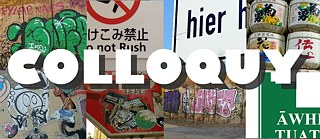Colloquy Episode 2
World words in New Zealand literature
Colloquy is a 4-episode podcast series which explores how other languages enlarge New Zealand literature written in English. We speak with New Zealand writers, publishers and readers about the role of “world words” in their work and the New Zealand literature they love.
In this second episode of new podcast series "Colloquy" we talk to novelists, poets, essayists and publishers who read and create books in English that include words and phrases from other languages.Why do writers of English include other languages in their work? What does it add? Are there any risks? How does the writer integrate the two languages in their work? How do editors imagine readers react to words from different languages to the one the book is primarily written in? Are there any particular editorial challenges to editing books which include languages other than the primary language of the book?
Wellington writer Pip Adam goes in search of some answers and chats with:
- Poet and essayist Chris Price who includes words from German and French in her poem “The Angel Question”
- Essayist and fiction writer Tina Makereti who never feels shut out by having words from another language in a book written in English
- Novelist Tim Corballis who included German words in his book “R.H.I”
- Victoria University Press publisher and editor of “Sport” literary journal Fergus Barrowman
- Writer Catherine Chidgey who used German words in her novel “The Wish Child” for sound and tone
- Essayist and poet Lynn Jenner who carries words from other languages over from her research and reading
- Victoria University Press editor and one of the founders of „Mimicry“ literary journal Holly Hunter
The music for Colloquy is “Alright Now“ written and performed by Brent McIntrye.
